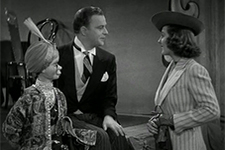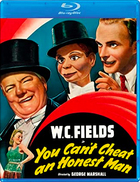You Can't Cheat an Honest Man
|  When You Can’t Cheat an Honest Man was released in 1939, its two main stars—comedian W.C. Fields, he of the bulbous, alcoholic nose and the nasally, trailing-off voice, and the wood-carved dummy Charlie McCarthy (performed by ventroliquist Edgar Bergen)—were already household names, having headlined the The Chase and Sanborn Hour for the previous two years. Part of the show’s schtick involved Fields and McCarthy throwing insults and jabs at each other during Fields’s comedy segment, resulting in a long-running “feud” that listeners eagerly anticipated each week. You Can’t Cheat an Honest Man essentially extends that popular radio feud to the big screen, in the process creating what is essentially two movies in one. One of them is a classic W.C. Fields comedy (the first in several years), with Fields playing a variation of his many amusing swindlers, hucksters, and con artists. In this case, he is the aptly named Larson E. Whipsnade, the less-than-honest proprietor of the “Circus Giganticus” who is always one step ahead of the police and his creditors (sometimes staying one step ahead means literally barreling down the highway and hoping they can cross the state line before they’re caught). The other film is a classic Charlie McCarthy comedy, which alternates lengthy depictions of Bergen and Charlie’s stage act with a plot involving Edgar’s romantic infatuation with Victoria (Constance Moore), who happens to be Whipsnade’s (much more honest) daughter. The screenplay by George Marion Jr., Richard Mack, and Everett Freeman from a story by Fields, writing under the name Charles Bogle (a common practice of the 19th-century humorists from which Fields was descended), doesn’t pretend to be anything more than a basic framework for Fields and McCarthy’s unique brands of humor, and neither disappoints. Fields, whose characters’ names are always a fine joke in and of themselves (previous characters he played include The Great McGonigol in 1934’s The Old Fashioned Way and Prof. Eustace P. McGargle in 1936’s Poppy), gives one of his enjoyable, garrulous performances here, reveling in his character’s complete lack of morality or even basic decency—until the final reel, that is. Writing in 1949, the film critic James Agee argued in his essay “Comedy’s Greatest Era” that Fields was the one great comedian to emerge out of the talkies, described as “majestically lethargic” and “the toughest and most warmly human of all screen comedians.” Those glorious contradictions are what make Fields so imminently watchable and his characters so utterly memorable. Whenever Fields isn’t on-screen, Bergen and Charlie take over, giving us the visual equivalent of their radio sketch comedy, which often involves Charlie articulating and attempting to act on the more restrained Bergen’s unspoken desires. Charlie is the id to Bergen’s super-ego, and their rapport is consistently witty and delightful, so perfectly balanced that you forget that Bergen is actually doing all the work (which is, of course, what made him one of the greatest ventriloquists of his era). The romantic plot involving Bergen’s pursuit of Victoria, who is considering marrying a young silver-spoon-in-his-mouth millionaire named Roger Bel-Goodie (James Bush) just to help her father out of his financial straits, doesn’t work nearly as well. But it never weighs down the proceedings and it also gives Fields’s character—who spends much of the movie desperately playing different roles in the circus, everything from ring master, to (very bad) ventriloquist—the opportunity to redeem himself by making sure Victoria ends up with the “right” man. The jokes are consistently effective, even as they veer wildly from slapstick to verbal wordplay, although racial humor involving Charlie in blackface has aged about as well as you might expect. George Marshall, a consummate professional who had previously directed a wide variety of films, including several Laurel and Hardy comedies, and would soon direct his most well-known works, Destry Rides Again (1940) and The Ghost Breakers (1940), is credited as the sole director, although most production histories note that he was given ample assistance by Edward F. Cline. Apparently, Marshall did not get along particularly well with W.C. Fields, while Cline, who had previously worked with Buster Keaton, did—so much so that he ended up directing Fields’s last three films: My Little Chickadee (1940), The Bank Dick (1940), and Never Give a Sucker an Even Break (1941). You Can’t Cheat an Honest Man was Fields’s first film under his new contract at Universal, after having been let go from Paramount a year earlier (along with Marlene Dietrich and Mae West). Unfortunately, it would also be one of his last films, as ailing health, which had largely kept him off the screen for the previous three years, would lead to an early death in 1946 at the age of 66. One can only imagine how many other amusingly named con artists he might have played.
Copyright © 2022 James Kendrick Thoughts? E-mail James Kendrick All images copyright © Kino Lorber | |||||||||||||||||||||||||||||
Overall Rating: 

 (3)
(3)


